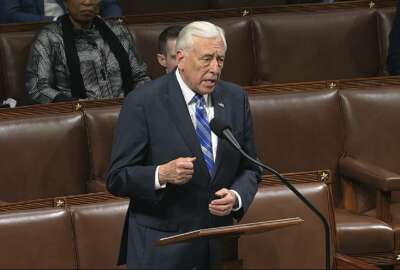
Pentagon looking into whether vendors are dropping out due to vaccine requirement
In today's Federal Newscast, the Defense Department is starting to gather data on whether the vaccination mandate for federal contractors is chasing away potential...
To listen to the Federal Newscast on your phone or mobile device, subscribe in PodcastOne or Apple Podcasts. The best listening experience on desktop can be found using Chrome, Firefox or Safari.
- The Defense Department is starting to gather data on whether the vaccination mandate for federal contractors is chasing away potential vendors. Starting next week, DoD is telling its components to start submitting weekly reports on how many contractors have refused to sign a contract clause to implement the vaccine requirement. DoD wants data on contracts worth more than $10 million, or any refusals that will have a “significant mission impact.”
- Defense Secretary Lloyd Austin said National Guard members who refuse to get the COVID-19 vaccine are not eligible for title 32 pay and will not be able to train. Guard members are legally obligated to drill and the training accrues toward their federal benefits. The National Guard said about 70% of its members have at least one shot. However, those numbers could be skewed because some troops may have gotten the vaccine through a private provider.
- The Navy is out with its vaccination numbers and a high proportion of the force is in compliance. Active duty sailors were required to be fully vaccinated by Nov. 28. About 96% of them made that mark. The Navy said more than 97% of the force has at least one vaccine shot. The service did not grant exceptions to COVID-19 vaccinate mandate easily. Out of the more than 2,500 requested religious accommodations the Navy granted zero. The Marine Corps was equally as strict with its service members. Seven sailors were given medical exemptions from the vaccine. More than 500 others have temporary exemptions. (Federal News Network)
- Agencies have a few new resources to help them surge federal hiring. The Office of Personnel Management is out with a new playbook and hiring authority guide. OPM said the resources are supposed to help agencies recruit more talent to implement the Infrastructure Investment and Jobs Act. Agencies face more pressure to hire scientists, engineers and others to support the new infrastructure law. But many already had hiring needs to fill vacancies from attrition and retirements. (Federal News Network)
- The federal government’s underperforming internship program would get an overhaul in a new House bill. Legislation from Rep. Gerry Connolly (D-Va.) would ensure federal interns get paid for their work. It also creates a new Federal Internship and Fellowship Center within the Office of Personnel Management. That center would be responsible for creating a centralized platform where students can find internships in government. The bill would also give successful interns credit to help them secure a permanent job in the competitive civil service.
- Special inspectors general already oversee U.S. efforts in Afghanistan and COVID-19 spending. But Rep. Nicole Malliotakis (R-N.Y.) is looking to create two special IGs positions to monitor federal dollars that go to states and major cities. Malliotakis is introducing two bills that would create these positions, both modeled after the Special IG for Afghanistan Reconstruction Congress created in 2008. The congresswoman cited agency IG reports detailing fraud waste and abuse of COVID-19 funds as the reason for creating these watchdog positions.
- The Social Security Administration successfully dealt with the dramatic increase in call volume during the pandemic. A new inspector general report found that despite receiving 14 million more calls in 2020 than in 2019, SSA reduced wait times and the number of callers who received a busy message. Auditors found SSA used a combination of increased personnel and automated services to deal with the increase volume. SSA hired 1,000 new employees in 2020. The agency plans to merge its current telephone systems to further improve services.
- A slew of President Joe Biden’s nominations are one step closer to confirmation. The Senate Homeland Security and Governmental Affairs Committee is advancing the nomination of Laurel Blatchford to serve as the first permanent controller at the Office of Management and Budget in nearly five years. Blatchford previously served as the chief of staff in the Department of Housing and Urban Development. The committee also advanced the nomination of Postal Regulatory Commission Chairman Michael Kubayanda to serve a full six-year term, and Erik Hooks to serve as deputy FEMA administrator.
- A new federal advisory committee is taking shape. What do a hacker, a bank executive and a college professor all have in common? They’re represented on the Cybersecurity and Infrastructure Security Agency’s new Cybersecurity Advisory Committee. CISA Director Jen Easterly announced the 23 inaugural members of the committee yesterday. They also include former homeland security officials, representatives from big tech firms and other sectors of private industry. The committee will meet for the first time on Dec. 10. (Federal News Network)
- The Department of Veterans Affairs will resume deployment of its electronic health record in March. The VA hospital in Columbus, Ohio, will be the second go-live site. The department has tentative plans to roll out the new record to 10 other sites in 2022. A new leadership structure will attempt to get the massive, multi-billion-dollar project under control. VA is hiring Terry Adirim to serve as the program executive director for EHR modernization. Adirim comes from a career at the Defense Department. She’ll manage the project’s daily operations. A new deputy chief information officer for EHR will report to her. (Federal News Network)
- This time DoD said it’s “for real” in how it will manage electromagnetic spectrum. The Defense Department’s chief information officer is reorganizing the office that manages electromagnetic spectrum. The revamped electromagnetic spectrum enterprise policy and program office will help run herd over 171 actions to implement the EMS Superiority Strategy released in 2020. The reorganized office will have deputy directors overseeing four of the five goals in the strategy through a working group approach that will include military services and defense agencies, who are responsible for most of the 171 actions. The working groups will track the implementation effort, ensure DoD-wide collaboration and address any obstacles at the OSD level.
- Microelectronics are the focus of a new industrial advisory committee at the Commerce Department. Experts on the committee will provide Commerce and other agencies with advice related to microelectronics research, development, manufacturing and policy. The Biden administration said it wants to strengthen U.S. competitiveness in the global chip industry. sector. Taiwan, South Korea and China are also major players in that sector. Commerce is now recruiting candidates to serve on the new advisory committee.
Copyright © 2024 Federal News Network. All rights reserved. This website is not intended for users located within the European Economic Area.
Eric White
Eric White is news anchor and Federal Drive producer at Federal News Network.
Follow @FEDERALNEWSCAST





